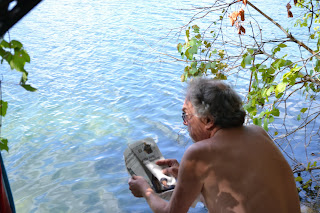Voracious nature is always eating away at manmade structures, like roads and bridges, but it is concurrently eating itself, too. In my neighborhood, vines are literally sucking the life out of shade trees. Today, Roy stood up to the destructive process. He rescued one of our trees from a sap-sucking vine that had embedded its tentacle roots into the bark. It was not easy.
 |
| Digging out roots by the handful. |
By the time I saw what was going on, the refuse pile of stems and roots was already big and growing. I wish I'd started taking pictures before he began, so you could have sized up the foe for yourself. Foe? It's not that we hate vines, in fact we have a new appreciation for their strength and tenacity. But our magnificent tree seemed a defenseless giant.
The shiny, deep green leaves of the vine are deceptively lovely as they envelop the trunk.
The vine's roots were not only embedded in the bark all over this huge tree, but they made a thick network in the earth all around the tree, too.
What's a sturdy Honda Civic for, but to do its master's bidding?
 |
Roy attached a rope to the car and the vine,
and let his muscle car do the heavy hauling. |
This was no Red Green contraption, though. The strength of the roots' underground attachments demanded strong mechanical help in ripping them out.
The crotch of the tree had been stuffed with roots, too, collecting water which over time would weaken the joint. A crowbar helped clear those away.
And finally . . .
 |
| . . . the victory smile. |
We are not fooled. We know there surely is some small fragment of vine root left in the earth or in the bark, and that tonight as I write, the vine has already begun to regrow its attachment to the tree. It will be up to the next property owners to recognize the contest and decide which is more important to them: The shade tree, with the watchfulness needed to keep it free? Or just let be what otherwise will be?

















